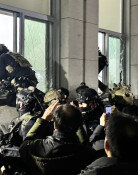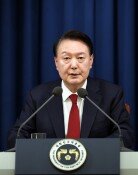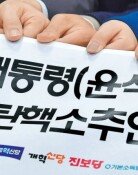Let’s allow the freedom of shouting ‘Hangul paiting!’
Let’s allow the freedom of shouting ‘Hangul paiting!’
Posted October. 09, 2023 08:11,
Updated October. 09, 2023 08:11
Today is Hangul Day, which commemorates the 580th anniversary of the invention of the Korean alphabet, which is called Hangul in Korean. Hangul Day is the day to celebrate that the English word ‘baseball’ is now written as how it sounds in Korean, not ‘yagu,’ which is a Korean word for the sport. Even without Hangul, baseball would be popular in South Korea, no matter how it was called in Korean – perhaps ‘yagu,’ ‘bonggu,’ or ‘nugu.’
While alphabets and language are different concepts, campaigns that promote using native words can be found around Hangul Day every year, as there is no anniversary to encourage the use of Korean native words. There must be an article that laments that King Sejong who invented the Korean alphabet will shed tears over the names of apartment brands, which mostly use English words.
While the frequent topic discussed in the social editorial section of a newspaper around Hangul Day is apartment brand names, it is ‘paiting’ in the sports section. It is often argued that native Korean words, such as ‘himnaeja’ or ‘aja,’ should be used instead of ‘paiting’. An editorial writer of a sports magazine said a few years ago that ‘paiting’ originated from Japan and is a word without nationality and that it can cause misunderstanding of picking a fight when heard by foreigners.
However, a word like ‘geummedal,’ which means a gold medal, is also a nationless word that originated in Japan by combining the Chinese character ‘金’ and the English word ‘medal.’ Plus, ‘paiting’s is undoubtedly a Korean word now. The official evidence for this is that the word is registered in the Standard Korean Language Dictionary published by the National Institute of Korean Language. As its name states, the dictionary contains standard Korean words. As such, a simple foreign word like ‘apple’ is not included in the dictionary.
Google search of ‘oppa fighting’ gets over 4.38 million results. There is a Wikipedia page that explains the Korean exclamation. It is explained that the word’s different variation, ‘hwaiting,’ has the same meaning. We now live in the world where people around the world acknowledges ‘paiting’ as a Korean word used for cheering and encouragement.
The biggest reason why English has become the strongest language in the world is that the countries that speak the language as their native language have the strongest power in the world. The second reason is that it has proactively adopted the vocabulary and grammar from other languages in the world.
Words survive if chosen by the people who speak them or disappear otherwise. ‘Paiting’ first appeared in the Dong-A Ilbo on September 5, 1926. A baseball coach named Seo Sang-gu whose team only managed to get third place in baseball ‘gurakbu’ games competed by four teams pointed ‘the lack of paiting’ as the cause of defeat. There must be a good reason why ‘paiting’ survived in the Korean language while a Japanese coined word ‘gurakbu,’ a Japnese coined word that means a club, disappeared. It is time to allow the freedom of shouting ‘Hangul paiting!’ to celebrate the day.







